For more information on the agenda, please check the Agenda tab.
Roberto Viola, Director General, DG CONNECT, European Commission
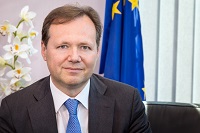 Roberto Viola holds a Doctor degree in Electronic Engineering (Dr. Eng.) and a Masters in Business Administration (MBA). He is Director General of DG CONNECT, in the European Commission. Between September 2012 and August 2015 he was Deputy Director-General of DG CONNECT with responsibilities for the Electronic Communications Networks and Services Directorate, Cooperation Directorate - International and Inter-institutional relations, Stakeholders cooperation, Coordination Directorate - Growth and Jobs, Innovations and Knowledge Base, Media and Data Directorate.
Roberto Viola holds a Doctor degree in Electronic Engineering (Dr. Eng.) and a Masters in Business Administration (MBA). He is Director General of DG CONNECT, in the European Commission. Between September 2012 and August 2015 he was Deputy Director-General of DG CONNECT with responsibilities for the Electronic Communications Networks and Services Directorate, Cooperation Directorate - International and Inter-institutional relations, Stakeholders cooperation, Coordination Directorate - Growth and Jobs, Innovations and Knowledge Base, Media and Data Directorate.From 2005 to 2012, he was the Secretary General in charge of managing AGCOM (Italian media and telecom regulator). He was Chairman of the European Radio Spectrum Policy group (RSPG) from 2012 to 2013, and Deputy Chairman in 2011 and Chairman in 2010. He was member of the BEREC Board (Body of European Telecom Regulators). He was Chairman of the European Regulatory Group (ERG) in 2007.
He served as Director of Regulation Department and Technical Director in AGCOM from 1999 to 2004, in charge of inter alia, regulation in terrestrial, cable and satellite television, frequency planning, access and interconnection of communication services, cost accounting and tariff in telecommunication and broadcasting services. From 1985-1999 he served in various positions as a staff member of the European Space Agency (ESA) in particular, he has been Head of Telecommunication and Broadcasting Satellite Services.
Giuseppe Abbamonte, Director, Media and Data, DG CONNECT, European Commission
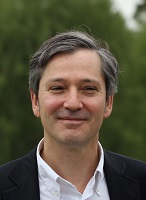 Giuseppe Abbamonte was appointed Director of the Media and Data Directorate in January 2014. The Directorate is, among many other things, responsible for the development and follow up of the European Big Data Strategy and the European regulatory framework on audiovisual media.
Giuseppe Abbamonte was appointed Director of the Media and Data Directorate in January 2014. The Directorate is, among many other things, responsible for the development and follow up of the European Big Data Strategy and the European regulatory framework on audiovisual media.
 Giuseppe Abbamonte was appointed Director of the Media and Data Directorate in January 2014. The Directorate is, among many other things, responsible for the development and follow up of the European Big Data Strategy and the European regulatory framework on audiovisual media.
Giuseppe Abbamonte was appointed Director of the Media and Data Directorate in January 2014. The Directorate is, among many other things, responsible for the development and follow up of the European Big Data Strategy and the European regulatory framework on audiovisual media. Shortly after his appointment as Director, Giuseppe delivered a major communication setting out the Commission’s strategy on data called ‘Towards a thriving data-driven economy’ and set up the European Public Private Partnership on ‘Big Data Value’.
In his former positions, he was the head of the electronic communications policy unit and then of the cybersecurity and on-line privacy unit. As part of the latter job, he supervised and directed the elaboration of the European Cybersecurity Strategy and of a proposal for a European law on network and information security. He also has extensive experience in complex merger cases and in consumer law.
Before joining the Commission he was an associate in an international law firm in Milan for four years (1989-1992), where he dealt mainly with commercial law and competition law.
He is the author of several publications mainly in English law magazines.
Niels-Christian Bilenberg, Centre for Digital Youth Care (Denmark)
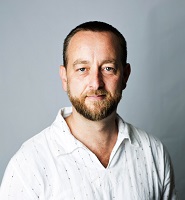 Niels-Christian Bilenberg is the Coordinator of the Danish Helpline Centre for Digital Youth Care where he, since 2007, has had the pedagogical responsibility of the counselling of adolescents through the online websites cyberhus.dk, netstof.dk, ungokonomi.dk and the newest, mitassist.dk, which will launch in November 2015.
Niels-Christian Bilenberg is the Coordinator of the Danish Helpline Centre for Digital Youth Care where he, since 2007, has had the pedagogical responsibility of the counselling of adolescents through the online websites cyberhus.dk, netstof.dk, ungokonomi.dk and the newest, mitassist.dk, which will launch in November 2015.Niels-Christian furthermore works as an external consultant, offering training of staff and ongoing sparring to municipal, governmental and NGO´s on various aspects of online counselling. He studied education and social work and, prior to joining Digital Youth Care, worked with children and adolescents in schools.
Patrick Burton, Centre for Justice and Crime Prevention (South Africa)
 Patrick Burton is the Executive Director of the Centre for Justice and Crime Prevention (CJCP), and holds a Master of Science degree in Development Studies from the University of KwaZulu-Natal (Durban).
Patrick Burton is the Executive Director of the Centre for Justice and Crime Prevention (CJCP), and holds a Master of Science degree in Development Studies from the University of KwaZulu-Natal (Durban).Over the past twenty years, Patrick has worked extensively on studies of youth and child victimisation and violence, including school violence, and more recently on online risks and opportunities in South Africa and the region. He leads the team responsible for the development and implementation of a National School Safety Framework for the National Department of Education in South Africa. He is a principal investigator on the UBS Optimus Foundation Study South Africa, a national incidence and prevalence study of child abuse, violence and neglect. Patrick is leading the South African team working on the Global Kids Online project, and has worked in South Africa, South Sudan, Ethiopia, Malawi, Tanzania, Mozambique, Namibia, and the Democratic Republic of Congo.
Jasmina Byrne, UNICEF Innocenti Research Centre (Italy)
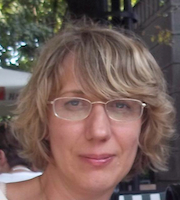 Jasmina Byrne is a senior researcher working at the UNICEF Office of Research - Innocenti, Florence, Italy. She leads the organisation’s research work on children and the internet, and has overseen and contributed to several UNICEF studies related to child safety online, cyberbullying and child rights on the internet (www.unicef-irc.org). In addition, she is responsible for developing and leading UNICEF’s global research agenda on family and parenting support.
Jasmina Byrne is a senior researcher working at the UNICEF Office of Research - Innocenti, Florence, Italy. She leads the organisation’s research work on children and the internet, and has overseen and contributed to several UNICEF studies related to child safety online, cyberbullying and child rights on the internet (www.unicef-irc.org). In addition, she is responsible for developing and leading UNICEF’s global research agenda on family and parenting support.
 Josie Fraser is an internationally-recognised social and educational technologist. She currently leads for Childnet International on the new national cyberbullying guidance for UK schools, funded by the Government Equalities Office. She has worked across education with government, industry, schools, further education providers and universities for over a decade, promoting and developing the effective, innovative and responsible use of technology. Her work particularly focuses on digital literacy, eSafety, open education, and technology to support community development.
Josie Fraser is an internationally-recognised social and educational technologist. She currently leads for Childnet International on the new national cyberbullying guidance for UK schools, funded by the Government Equalities Office. She has worked across education with government, industry, schools, further education providers and universities for over a decade, promoting and developing the effective, innovative and responsible use of technology. Her work particularly focuses on digital literacy, eSafety, open education, and technology to support community development.
Uwe Hasebrink, Hans Bredow Institute for Media Research (Germany)
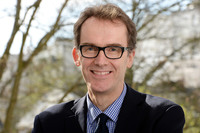 Prof. Dr. Uwe Hasebrink is the Director of the Hans Bredow Institute for Media Research and full professor for Empirical Communication Research at the University of Hamburg. His main research interests refer to media uses and media effects in digital environments, with a particular focus on intercultural comparisons. He is currently involved in the Reuters Institute Digital News Survey (see www.digitalnewsreport.org). An important part of his research is related to children and young people and to child safety.
Prof. Dr. Uwe Hasebrink is the Director of the Hans Bredow Institute for Media Research and full professor for Empirical Communication Research at the University of Hamburg. His main research interests refer to media uses and media effects in digital environments, with a particular focus on intercultural comparisons. He is currently involved in the Reuters Institute Digital News Survey (see www.digitalnewsreport.org). An important part of his research is related to children and young people and to child safety.
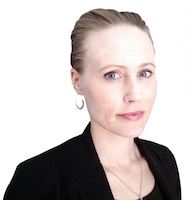 Gry Hasselbalch works worldwide as Mediamocracy.org with public institutions, academia, civil society and intergovernmental organisations. She conducts research, reports, documentation, talks, teaching and advocacy dealing with the intersection of tech and society.
Gry Hasselbalch works worldwide as Mediamocracy.org with public institutions, academia, civil society and intergovernmental organisations. She conducts research, reports, documentation, talks, teaching and advocacy dealing with the intersection of tech and society.
Ida, Youth ambassador (Sweden)
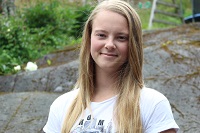 Ida is a student from Sweden. In 2014, she represented Sweden in the European Youth Panel and afterwards she had the opportunity to become a youth ambassador. Last year, when she attended Safer Internet Forum 2014, she was one of the youngest participants and she was very impressed that the adult audience wanted to hear the opinion of youth. This year, she has made it her mission to again make sure that her voice is heard and that youth views on the internet are represented.
Ida is a student from Sweden. In 2014, she represented Sweden in the European Youth Panel and afterwards she had the opportunity to become a youth ambassador. Last year, when she attended Safer Internet Forum 2014, she was one of the youngest participants and she was very impressed that the adult audience wanted to hear the opinion of youth. This year, she has made it her mission to again make sure that her voice is heard and that youth views on the internet are represented.
Grace Kelly, Youth ambassador (Ireland)
 Grace Kelly, a student of Trinity College Dublin, has worked with the Webwise Youth Panel of the PDST (Professional Development Service for Teachers) in Ireland for the past four years. Having attended many Safer Internet Forums, Grace continues on with Insafe as a Youth Ambassador.
Grace Kelly, a student of Trinity College Dublin, has worked with the Webwise Youth Panel of the PDST (Professional Development Service for Teachers) in Ireland for the past four years. Having attended many Safer Internet Forums, Grace continues on with Insafe as a Youth Ambassador.
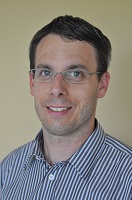 Eric Krier studied sociology at the University of Augsburg and worked on European youth projects in parallel, so that before the end of the last millennium (the times of mIRC and ICQ), ICT quickly became a common part of his work and life. Since 2002, he has been working for the National Youth Service (snj.lu) in Luxembourg where currently he is in charge of the department called 'Youth work support'.
Eric Krier studied sociology at the University of Augsburg and worked on European youth projects in parallel, so that before the end of the last millennium (the times of mIRC and ICQ), ICT quickly became a common part of his work and life. Since 2002, he has been working for the National Youth Service (snj.lu) in Luxembourg where currently he is in charge of the department called 'Youth work support'.
Ľuboš, Youth ambassador (Slovakia)
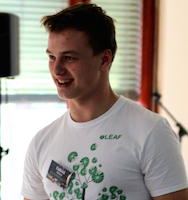 Ľuboš is currently in his final year of high school. His interest in making the internet a better place began when he was 13 and participated at the Safer Internet Forum as a panellist. Later he was elected as a Youth Ambassador in a project with Vivendi and Insafe, and participated at the next Safer Internet Forum as a co-moderator. Within the scope of the Youth Ambassador project, he also took part in a media literacy conference at ENS Cachan and a sustainable seminar in Paris.
Ľuboš is currently in his final year of high school. His interest in making the internet a better place began when he was 13 and participated at the Safer Internet Forum as a panellist. Later he was elected as a Youth Ambassador in a project with Vivendi and Insafe, and participated at the next Safer Internet Forum as a co-moderator. Within the scope of the Youth Ambassador project, he also took part in a media literacy conference at ENS Cachan and a sustainable seminar in Paris.
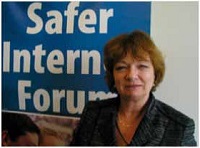 Pat Manson is Head of the Inclusion, Skills & Youth Unit of the European Commission’s Directorate General for Communication Networks, Content and Technology (DG CONNECT). The unit’s goal is to ensure that citizens, especially youth and those at risk of exclusion, are best able to benefit from the internet and have the necessary skills to do so.
Pat Manson is Head of the Inclusion, Skills & Youth Unit of the European Commission’s Directorate General for Communication Networks, Content and Technology (DG CONNECT). The unit’s goal is to ensure that citizens, especially youth and those at risk of exclusion, are best able to benefit from the internet and have the necessary skills to do so.
 For the past 30 years, David has had a wide range of executive leadership roles in the technology and telecommunications sector including IBM, Compaq and Motorola. He is currently FOSI's Director for Europe. FOSI (Family Online Safety Institute) is an international non-profit organisation which works to make the online world safer for kids and their families.
For the past 30 years, David has had a wide range of executive leadership roles in the technology and telecommunications sector including IBM, Compaq and Motorola. He is currently FOSI's Director for Europe. FOSI (Family Online Safety Institute) is an international non-profit organisation which works to make the online world safer for kids and their families.
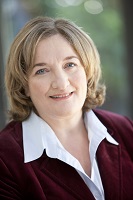 Annie Mullins provides independent strategic consultancy to support digital social and gaming companies to safeguard online users and protect their reputations and brands. She is currently the Director of Trust and Safety for Ask.fm Europe.
Annie Mullins provides independent strategic consultancy to support digital social and gaming companies to safeguard online users and protect their reputations and brands. She is currently the Director of Trust and Safety for Ask.fm Europe.
 Brian O’Neill is Director, Research, Enterprise and Innovation Services at Dublin Institute of Technology. Brian’s research areas include media policy and digital technologies; media and information literacy, eSafety and information society policy for children. He has an international profile as a researcher on young people’s use of new media and the internet, and has conducted research for the European Commission, UNICEF, and the Broadcasting Authority of Ireland.
Brian O’Neill is Director, Research, Enterprise and Innovation Services at Dublin Institute of Technology. Brian’s research areas include media policy and digital technologies; media and information literacy, eSafety and information society policy for children. He has an international profile as a researcher on young people’s use of new media and the internet, and has conducted research for the European Commission, UNICEF, and the Broadcasting Authority of Ireland.
Andrea Parola, ICT Coalition for Children Online (Belgium)
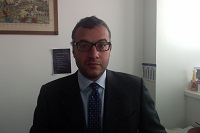 Andrea Parola is a consultant, based in Brussels. Since 2011 he has been the project manager of the ‘ICT Coalition for Children Online’, which is a self-regulatory platform with more than 20 leading companies to make the internet safer and better for children and young people.
Andrea Parola is a consultant, based in Brussels. Since 2011 he has been the project manager of the ‘ICT Coalition for Children Online’, which is a self-regulatory platform with more than 20 leading companies to make the internet safer and better for children and young people.
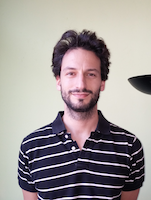 Martin Schmalzried holds a Master’s Degree from the ULB (Brussels) in Political Science and is a licensed sociology teacher in upper secondary education. He has been working at COFACE (Confederation of Family Organisations in the EU) as a Policy Officer for over five years.
Martin Schmalzried holds a Master’s Degree from the ULB (Brussels) in Political Science and is a licensed sociology teacher in upper secondary education. He has been working at COFACE (Confederation of Family Organisations in the EU) as a Policy Officer for over five years.
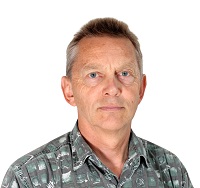 Kuno Sørensen is a psychologist and senior child protection advisor with Save the Children Denmark. Since 2001, he was programme coordinator with a special focus on IT-related sexual abuse of children both on the Danish hotline against child abuse material and on the awareness website sikkerchat.dk (Safe chat). He worked as a member of the EU knowledge-enhancement project ROBERT (Risk-taking Online Behaviour – Empowerment through Research and Training), was a member of the EU Kids Online International Advisory Panel and has been a board member of the eNACSO non-governmental organisation (NGO) network. He has initiated counselling for sexual offenders, brydcirklen.dk (Break the circle), and conducted research and published articles on grooming and other online safety issues.
Kuno Sørensen is a psychologist and senior child protection advisor with Save the Children Denmark. Since 2001, he was programme coordinator with a special focus on IT-related sexual abuse of children both on the Danish hotline against child abuse material and on the awareness website sikkerchat.dk (Safe chat). He worked as a member of the EU knowledge-enhancement project ROBERT (Risk-taking Online Behaviour – Empowerment through Research and Training), was a member of the EU Kids Online International Advisory Panel and has been a board member of the eNACSO non-governmental organisation (NGO) network. He has initiated counselling for sexual offenders, brydcirklen.dk (Break the circle), and conducted research and published articles on grooming and other online safety issues.
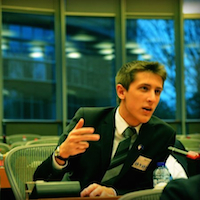 Richard Steppe is a PhD researcher attached to the Research Institute for Consumer, Competition and Market at the University of Leuven. He acquired his Master of Laws at the same university (magna cum laude, 2015) and also studied at the University of Copenhagen (Erasmus+) and Wake Forest University (as a Benjamin Franklin Transatlantic Fellow via a grant of the US State Department).
Richard Steppe is a PhD researcher attached to the Research Institute for Consumer, Competition and Market at the University of Leuven. He acquired his Master of Laws at the same university (magna cum laude, 2015) and also studied at the University of Copenhagen (Erasmus+) and Wake Forest University (as a Benjamin Franklin Transatlantic Fellow via a grant of the US State Department).
 Jasmina Byrne is a senior researcher working at the UNICEF Office of Research - Innocenti, Florence, Italy. She leads the organisation’s research work on children and the internet, and has overseen and contributed to several UNICEF studies related to child safety online, cyberbullying and child rights on the internet (www.unicef-irc.org). In addition, she is responsible for developing and leading UNICEF’s global research agenda on family and parenting support.
Jasmina Byrne is a senior researcher working at the UNICEF Office of Research - Innocenti, Florence, Italy. She leads the organisation’s research work on children and the internet, and has overseen and contributed to several UNICEF studies related to child safety online, cyberbullying and child rights on the internet (www.unicef-irc.org). In addition, she is responsible for developing and leading UNICEF’s global research agenda on family and parenting support.Prior to joining Innocenti, Jasmina was head of the UNICEF child protection programme in Indonesia. She has more than 15 years’ international experience in managing complex child rights and protection programmes, including research, policy development, programme design and evaluation in South East Asia, Europe and Southern Africa with UNICEF, Save the Children, International Committee of the Red Cross and UN Women.
John Carr OBE, eNACSO (UK)
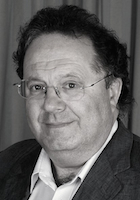 John Carr is Expert Adviser to the European NGO Alliance for Child Safety Online and to Bangkok-based global NGO, ECPAT International. He is also Secretary of the UK Children’s Charities’ Coalition for Internet Safety (CHIS) and a Member of the UK Government’s Council for Child Internet Safety (UKCCIS).
John Carr is Expert Adviser to the European NGO Alliance for Child Safety Online and to Bangkok-based global NGO, ECPAT International. He is also Secretary of the UK Children’s Charities’ Coalition for Internet Safety (CHIS) and a Member of the UK Government’s Council for Child Internet Safety (UKCCIS).
Ernesto Caffo, Telefono Azzurro (Italy)
 Ernesto Caffo is current President and founder of SOS Il Telefono Azzurro Onlus and Foundation Child. He is Chair Professor of Child and Adolescent Psychiatry, Director of the School of Specialisation in Child and Adolescent Psychiatry and of the Master’s degree course ‘Assessment and intervention in situation of child sex abuse and paedophilia’ at the University of Modena and Reggio Emilia, Italy.
Ernesto Caffo is current President and founder of SOS Il Telefono Azzurro Onlus and Foundation Child. He is Chair Professor of Child and Adolescent Psychiatry, Director of the School of Specialisation in Child and Adolescent Psychiatry and of the Master’s degree course ‘Assessment and intervention in situation of child sex abuse and paedophilia’ at the University of Modena and Reggio Emilia, Italy.
 Dieter Cartensen is Head of Digital Child Safety at the LEGO Group, a position that sees him involved in defining policy frames for end-user safety, the development of age-appropriate consumer experiences, as well as ensuring compliant data collection from, and marketing to, children. In other words, he works across the digital value chain. He partakes in international work settings addressing marketing to children and digital governance on behalf of the LEGO Group.
Dieter Cartensen is Head of Digital Child Safety at the LEGO Group, a position that sees him involved in defining policy frames for end-user safety, the development of age-appropriate consumer experiences, as well as ensuring compliant data collection from, and marketing to, children. In other words, he works across the digital value chain. He partakes in international work settings addressing marketing to children and digital governance on behalf of the LEGO Group.
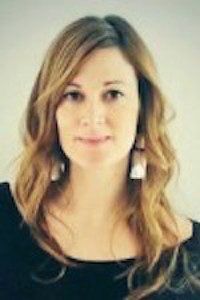 Dr. Gemma Galdon Clavell is a policy analyst working on surveillance, social, legal and ethical impacts of technology, smart cities, privacy, security policy, resilience and policing. She is a founding partner at Eticas Research & Consulting and a researcher at the Universitat de Barcelona’s Sociology Department. She completed her PhD on surveillance, security and urban policy in early 2012 at the Universitat Autònoma de Barcelona, where she also received an MSc in Policy Management, and was later appointed Director of the Security Policy Programme at the Universitat Oberta de Catalunya (UOC).
Dr. Gemma Galdon Clavell is a policy analyst working on surveillance, social, legal and ethical impacts of technology, smart cities, privacy, security policy, resilience and policing. She is a founding partner at Eticas Research & Consulting and a researcher at the Universitat de Barcelona’s Sociology Department. She completed her PhD on surveillance, security and urban policy in early 2012 at the Universitat Autònoma de Barcelona, where she also received an MSc in Policy Management, and was later appointed Director of the Security Policy Programme at the Universitat Oberta de Catalunya (UOC).
Helena Dal, Swedish Media Council (Sweden)
 Helena Dal is department manager for the information and guidance related to media literacy at the Swedish Media Council. She comes from a recent post as Project Manager at the Swedish Educational Broadcasting Company, UR. She has great experience in managing communication processes with regards to education and training. She has many years of experience in working as a teacher for older children.
Helena Dal is department manager for the information and guidance related to media literacy at the Swedish Media Council. She comes from a recent post as Project Manager at the Swedish Educational Broadcasting Company, UR. She has great experience in managing communication processes with regards to education and training. She has many years of experience in working as a teacher for older children.
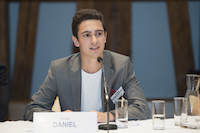 For more than five years, Florian Daniel, a 19-year-old working student, has been engaged in online-safety processes. Thanks to his technical education in Austria, he has an in-depth knowledge of online problems and technical aspects. Further engagement on national and international levels have helped Florian to gain a very good understanding of online safety issues concerning children and adults. Assisting with the creation of the Youth Manifesto was one of his main achievements in the past year. Since August 2015, Florian works at Kaspersky Lab, one of the world’s leading antivirus companies, in the public relations department in London.
For more than five years, Florian Daniel, a 19-year-old working student, has been engaged in online-safety processes. Thanks to his technical education in Austria, he has an in-depth knowledge of online problems and technical aspects. Further engagement on national and international levels have helped Florian to gain a very good understanding of online safety issues concerning children and adults. Assisting with the creation of the Youth Manifesto was one of his main achievements in the past year. Since August 2015, Florian works at Kaspersky Lab, one of the world’s leading antivirus companies, in the public relations department in London.
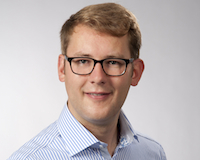 Michael Dreier holds a degree in sociology with a focus on consumption, social diversity and methodology in relation to new media and video games. During his employment at the Medical Psychology and Medical Sociology of the Johannes Gutenberg-University Mainz, his interdisciplinary interest was further stimulated. He is researcher and project manager at the Outpatient Clinic for Behavioural Addictions, Department for Psychosomatic Medicine and Psychotherapy at the University Medical Center Mainz Germany (UMC-Mainz) and colleague of Dr. Klaus Wölfling and Prof. Dr. Manfred E. Beutel.
Michael Dreier holds a degree in sociology with a focus on consumption, social diversity and methodology in relation to new media and video games. During his employment at the Medical Psychology and Medical Sociology of the Johannes Gutenberg-University Mainz, his interdisciplinary interest was further stimulated. He is researcher and project manager at the Outpatient Clinic for Behavioural Addictions, Department for Psychosomatic Medicine and Psychotherapy at the University Medical Center Mainz Germany (UMC-Mainz) and colleague of Dr. Klaus Wölfling and Prof. Dr. Manfred E. Beutel.
 Becky Foreman is Head of UK Government Affairs for Microsoft, where she manages Microsoft’s relationship with government and parliament and handles a wide variety of policy issues including data protection and privacy, diversity and inclusion, education, intellectual property, child online safety and cybersecurity.
Becky Foreman is Head of UK Government Affairs for Microsoft, where she manages Microsoft’s relationship with government and parliament and handles a wide variety of policy issues including data protection and privacy, diversity and inclusion, education, intellectual property, child online safety and cybersecurity.
 John Carr is Expert Adviser to the European NGO Alliance for Child Safety Online and to Bangkok-based global NGO, ECPAT International. He is also Secretary of the UK Children’s Charities’ Coalition for Internet Safety (CHIS) and a Member of the UK Government’s Council for Child Internet Safety (UKCCIS).
John Carr is Expert Adviser to the European NGO Alliance for Child Safety Online and to Bangkok-based global NGO, ECPAT International. He is also Secretary of the UK Children’s Charities’ Coalition for Internet Safety (CHIS) and a Member of the UK Government’s Council for Child Internet Safety (UKCCIS).John was formerly a Senior Expert Adviser to the United Nations (International Telecommunication Union) and Adviser to the European Network and Information Security Agency (ENISA). He was a Visiting Fellow at the London School of Economics and Political Science (LSE) as well as Former Vice President of MySpace and Former Member of the Microsoft’s Policy Board for Europe, the Middle East and Africa.
He is the author of The role of the internet in the commission of crime and Out of sight, out of mind – global response to child pornography on the internet. John is also a member of the Europol Expert Platform.
 Ernesto Caffo is current President and founder of SOS Il Telefono Azzurro Onlus and Foundation Child. He is Chair Professor of Child and Adolescent Psychiatry, Director of the School of Specialisation in Child and Adolescent Psychiatry and of the Master’s degree course ‘Assessment and intervention in situation of child sex abuse and paedophilia’ at the University of Modena and Reggio Emilia, Italy.
Ernesto Caffo is current President and founder of SOS Il Telefono Azzurro Onlus and Foundation Child. He is Chair Professor of Child and Adolescent Psychiatry, Director of the School of Specialisation in Child and Adolescent Psychiatry and of the Master’s degree course ‘Assessment and intervention in situation of child sex abuse and paedophilia’ at the University of Modena and Reggio Emilia, Italy.He is currently a board member of the International Centre for Missing & Exploited Children (ICMEC) and of Missing Children Europe. He is also President of Children First Foundation. Professor Caffo has committed his life to promote children’s rights both at a national and international level. He is the author of several books and articles on child psychiatry, child abuse and children’s rights, and he provides professional education, training opportunities and knowledge-based interventions in the field.
Professor Caffo is also member of several scientific and international organisations. He served on the Board of Directors of the International Association for Child and Adolescent Psychiatry and Allied Professions. He was President of the European Society for Child and Adolescents Psychiatry.
Dieter Cartensen, LEGO (Denmark)
 Dieter Cartensen is Head of Digital Child Safety at the LEGO Group, a position that sees him involved in defining policy frames for end-user safety, the development of age-appropriate consumer experiences, as well as ensuring compliant data collection from, and marketing to, children. In other words, he works across the digital value chain. He partakes in international work settings addressing marketing to children and digital governance on behalf of the LEGO Group.
Dieter Cartensen is Head of Digital Child Safety at the LEGO Group, a position that sees him involved in defining policy frames for end-user safety, the development of age-appropriate consumer experiences, as well as ensuring compliant data collection from, and marketing to, children. In other words, he works across the digital value chain. He partakes in international work settings addressing marketing to children and digital governance on behalf of the LEGO Group.Prior to working for the LEGO Group, he was a project manager at Save the Children, co-initiator of eNACSO and Chair of the Board, International Advisor to the EU Kids Online project, and Vice President of the INHOPE Board.
Dieter lives with his wife and two children in Copenhagen, Denmark.
Gemma Galdon Clavell, University of Barcelona (Spain)
 Dr. Gemma Galdon Clavell is a policy analyst working on surveillance, social, legal and ethical impacts of technology, smart cities, privacy, security policy, resilience and policing. She is a founding partner at Eticas Research & Consulting and a researcher at the Universitat de Barcelona’s Sociology Department. She completed her PhD on surveillance, security and urban policy in early 2012 at the Universitat Autònoma de Barcelona, where she also received an MSc in Policy Management, and was later appointed Director of the Security Policy Programme at the Universitat Oberta de Catalunya (UOC).
Dr. Gemma Galdon Clavell is a policy analyst working on surveillance, social, legal and ethical impacts of technology, smart cities, privacy, security policy, resilience and policing. She is a founding partner at Eticas Research & Consulting and a researcher at the Universitat de Barcelona’s Sociology Department. She completed her PhD on surveillance, security and urban policy in early 2012 at the Universitat Autònoma de Barcelona, where she also received an MSc in Policy Management, and was later appointed Director of the Security Policy Programme at the Universitat Oberta de Catalunya (UOC).Previously, she worked at the Transnational Institute, the United Nations’ Institute for Training and Research (UNITAR) and the Catalan Institute for Public Security. She teaches topics related to her research at several foreign universities, mainly in Latin America, and is a member of the IDRC-funded Latin American Surveillance Studies Network.
Additionally, she is a member of the international advisory board of Privacy International and a regular analyst on TV, radio and print media. Her recent academic publications tackle issues related to the proliferation of surveillance in urban settings, urban security policy and community safety, security and mega events, the relationship between privacy and technology and smart cities.
Helena Dal, Swedish Media Council (Sweden)
 Helena Dal is department manager for the information and guidance related to media literacy at the Swedish Media Council. She comes from a recent post as Project Manager at the Swedish Educational Broadcasting Company, UR. She has great experience in managing communication processes with regards to education and training. She has many years of experience in working as a teacher for older children.
Helena Dal is department manager for the information and guidance related to media literacy at the Swedish Media Council. She comes from a recent post as Project Manager at the Swedish Educational Broadcasting Company, UR. She has great experience in managing communication processes with regards to education and training. She has many years of experience in working as a teacher for older children.Florian Daniel, Youth ambassador (Austria)
 For more than five years, Florian Daniel, a 19-year-old working student, has been engaged in online-safety processes. Thanks to his technical education in Austria, he has an in-depth knowledge of online problems and technical aspects. Further engagement on national and international levels have helped Florian to gain a very good understanding of online safety issues concerning children and adults. Assisting with the creation of the Youth Manifesto was one of his main achievements in the past year. Since August 2015, Florian works at Kaspersky Lab, one of the world’s leading antivirus companies, in the public relations department in London.
For more than five years, Florian Daniel, a 19-year-old working student, has been engaged in online-safety processes. Thanks to his technical education in Austria, he has an in-depth knowledge of online problems and technical aspects. Further engagement on national and international levels have helped Florian to gain a very good understanding of online safety issues concerning children and adults. Assisting with the creation of the Youth Manifesto was one of his main achievements in the past year. Since August 2015, Florian works at Kaspersky Lab, one of the world’s leading antivirus companies, in the public relations department in London.Michael Dreier, Outpatient Clinic for Behavioural Addictions UMC-Mainz (Germany)
 Michael Dreier holds a degree in sociology with a focus on consumption, social diversity and methodology in relation to new media and video games. During his employment at the Medical Psychology and Medical Sociology of the Johannes Gutenberg-University Mainz, his interdisciplinary interest was further stimulated. He is researcher and project manager at the Outpatient Clinic for Behavioural Addictions, Department for Psychosomatic Medicine and Psychotherapy at the University Medical Center Mainz Germany (UMC-Mainz) and colleague of Dr. Klaus Wölfling and Prof. Dr. Manfred E. Beutel.
Michael Dreier holds a degree in sociology with a focus on consumption, social diversity and methodology in relation to new media and video games. During his employment at the Medical Psychology and Medical Sociology of the Johannes Gutenberg-University Mainz, his interdisciplinary interest was further stimulated. He is researcher and project manager at the Outpatient Clinic for Behavioural Addictions, Department for Psychosomatic Medicine and Psychotherapy at the University Medical Center Mainz Germany (UMC-Mainz) and colleague of Dr. Klaus Wölfling and Prof. Dr. Manfred E. Beutel.Michael was involved in different EU-projects on participation as well as coordination levels, and is member of the International Advisory Panel for EU Kids Online. The randomised controlled clinical trial STICA is coordinated by him. The involvement in several surveys on media use as well as gambling and internet addiction investigating very young children, children and adolescents culminates in the development of a Prevention Program for Behavioural Addictions, which is provided via Digital Tool Boxes.
His engagement as board member and treasurer for the Association of Media Addiction Germany represents his honorary work for immanent society’s changes.
Becky Foreman, Microsoft (UK)
 Becky Foreman is Head of UK Government Affairs for Microsoft, where she manages Microsoft’s relationship with government and parliament and handles a wide variety of policy issues including data protection and privacy, diversity and inclusion, education, intellectual property, child online safety and cybersecurity.
Becky Foreman is Head of UK Government Affairs for Microsoft, where she manages Microsoft’s relationship with government and parliament and handles a wide variety of policy issues including data protection and privacy, diversity and inclusion, education, intellectual property, child online safety and cybersecurity.She sits on the Board of the Internet Watch Foundation (IWF) and leads on online safety policy for Microsoft in EMEA (Europe, the Middle East and Africa). Becky was previously an Associate Director at Portland Communications where she managed a team of consultants servicing Portland’s media and technology clients including Google, Apple, Vodafone and Virgin Media.
Prior to this, Becky worked at Ofcom, where she ran the Chairman’s Office and also established Ofcom’s outreach to the European Parliament and European Commission. Becky started her career working for Conservative politicians in both Westminster and Brussels, including Rt Hon. Caroline Spelman MP and Malcolm Harbour MEP.
Josie Fraser, Social and Educational Technologist (UK)
 Josie Fraser is an internationally-recognised social and educational technologist. She currently leads for Childnet International on the new national cyberbullying guidance for UK schools, funded by the Government Equalities Office. She has worked across education with government, industry, schools, further education providers and universities for over a decade, promoting and developing the effective, innovative and responsible use of technology. Her work particularly focuses on digital literacy, eSafety, open education, and technology to support community development.
Josie Fraser is an internationally-recognised social and educational technologist. She currently leads for Childnet International on the new national cyberbullying guidance for UK schools, funded by the Government Equalities Office. She has worked across education with government, industry, schools, further education providers and universities for over a decade, promoting and developing the effective, innovative and responsible use of technology. Her work particularly focuses on digital literacy, eSafety, open education, and technology to support community development.Since June 2010, Josie has led on the ICT strand of Leicester City Council's £350 million schools building programme. She is responsible for setting, promoting and delivering on educational transformation in relation to the use of technology within schools. She leads on DigiLit Leicester, an award-winning schools’ workforce development project designed to raise digital literacy competencies, to enhance practice and in turn raise learner engagement and achievement.
Will Gardner, Childnet International (UK)
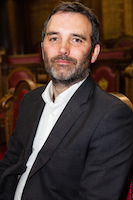 Will Gardner is the CEO of Childnet International, a children’s charity working with others to help make the internet a great and safe place for children.
Will Gardner is the CEO of Childnet International, a children’s charity working with others to help make the internet a great and safe place for children.
 Ellen Gorris is an assistant policy officer for rights of the child at DG Justice and Consumers. In this capacity, she works in particular on files relating to violence against children, including child trafficking, child sexual abuse and exploitation, FGM (female genital mutilation), bullying, and children's rights and protection online.
Ellen Gorris is an assistant policy officer for rights of the child at DG Justice and Consumers. In this capacity, she works in particular on files relating to violence against children, including child trafficking, child sexual abuse and exploitation, FGM (female genital mutilation), bullying, and children's rights and protection online.
Wendy M. Grossman, Freelance writer (UK)
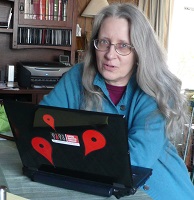 Wendy M. Grossman is a freelance writer based in London. She has covered the internet and related technology for nearly 25 years, and has written for publications such as the Guardian, New Scientist, Scientific American, and the Daily Telegraph. She is author of several books, including net.wars (NYU Press, 1998), and has written a weekly column by the same name continuously since 2001. Her website is at www.pelicancrossing.net; she is @wendyg on Twitter.
Wendy M. Grossman is a freelance writer based in London. She has covered the internet and related technology for nearly 25 years, and has written for publications such as the Guardian, New Scientist, Scientific American, and the Daily Telegraph. She is author of several books, including net.wars (NYU Press, 1998), and has written a weekly column by the same name continuously since 2001. Her website is at www.pelicancrossing.net; she is @wendyg on Twitter.
 Will Gardner is the CEO of Childnet International, a children’s charity working with others to help make the internet a great and safe place for children.
Will Gardner is the CEO of Childnet International, a children’s charity working with others to help make the internet a great and safe place for children.Will Gardner has been at Childnet since 2000 and has been the CEO since 2009. He is a lead partner at the UK Safer Internet Centre (see www.saferinternet.org.uk) and, in this role, organises Safer Internet Day (SID) in the UK. He is a member of the Executive Board of the UK Council for Child Internet Safety (UKCCIS), and is also on Facebook’s Safety Advisory Board.
Will lives in London with his wife and their five children.
Ellen Gorris, DG Justice and Consumers, European Commission
 Ellen Gorris is an assistant policy officer for rights of the child at DG Justice and Consumers. In this capacity, she works in particular on files relating to violence against children, including child trafficking, child sexual abuse and exploitation, FGM (female genital mutilation), bullying, and children's rights and protection online.
Ellen Gorris is an assistant policy officer for rights of the child at DG Justice and Consumers. In this capacity, she works in particular on files relating to violence against children, including child trafficking, child sexual abuse and exploitation, FGM (female genital mutilation), bullying, and children's rights and protection online.Prior to joining the European Commission, she completed internships at the International Commission of Jurists (Brussels), Human Rights Watch (Amsterdam/NYC) and the Dutch National Rapporteur on Trafficking in Human Beings and Sexual Violence Against Children (The Hague).
Ellen holds degrees in European Law (LL.B, Maastricht University), Public International Law (LL.M, University of Amsterdam), and an advanced master's degree in Human Rights and Democratisation (European Inter-University Centre Venice, Italy and Central European University, Budapest).
Wendy M. Grossman, Freelance writer (UK)
 Wendy M. Grossman is a freelance writer based in London. She has covered the internet and related technology for nearly 25 years, and has written for publications such as the Guardian, New Scientist, Scientific American, and the Daily Telegraph. She is author of several books, including net.wars (NYU Press, 1998), and has written a weekly column by the same name continuously since 2001. Her website is at www.pelicancrossing.net; she is @wendyg on Twitter.
Wendy M. Grossman is a freelance writer based in London. She has covered the internet and related technology for nearly 25 years, and has written for publications such as the Guardian, New Scientist, Scientific American, and the Daily Telegraph. She is author of several books, including net.wars (NYU Press, 1998), and has written a weekly column by the same name continuously since 2001. Her website is at www.pelicancrossing.net; she is @wendyg on Twitter.Uwe Hasebrink, Hans Bredow Institute for Media Research (Germany)
 Prof. Dr. Uwe Hasebrink is the Director of the Hans Bredow Institute for Media Research and full professor for Empirical Communication Research at the University of Hamburg. His main research interests refer to media uses and media effects in digital environments, with a particular focus on intercultural comparisons. He is currently involved in the Reuters Institute Digital News Survey (see www.digitalnewsreport.org). An important part of his research is related to children and young people and to child safety.
Prof. Dr. Uwe Hasebrink is the Director of the Hans Bredow Institute for Media Research and full professor for Empirical Communication Research at the University of Hamburg. His main research interests refer to media uses and media effects in digital environments, with a particular focus on intercultural comparisons. He is currently involved in the Reuters Institute Digital News Survey (see www.digitalnewsreport.org). An important part of his research is related to children and young people and to child safety.After acting as work package leader in the EC-funded research network EU Kids Online since 2006, he became the network coordinator in 2015 (see www.eukidsonline.net). Together with the German Federal Ministry for Family Affairs, Senior Citizens, Women and Youth and the team of the Hans Bredow Institute, he organised the ‘Net Children 2020’ conference in Berlin (see www.netchildren2020.eu).
Gry Hasselbach, Mediamocracy.org (Denmark)
 Gry Hasselbalch works worldwide as Mediamocracy.org with public institutions, academia, civil society and intergovernmental organisations. She conducts research, reports, documentation, talks, teaching and advocacy dealing with the intersection of tech and society.
Gry Hasselbalch works worldwide as Mediamocracy.org with public institutions, academia, civil society and intergovernmental organisations. She conducts research, reports, documentation, talks, teaching and advocacy dealing with the intersection of tech and society.Gry is one of the founders of the European think-and-do tank DataEthics.eu and the Global Privacy as Innovation network that view privacy and data ethics as economic and social investments. The aim is to influence global debates with a data ethics perspective.
In her writing and research, Gry covers areas related to human rights and technology, language and power, privacy innovation and internet governance. This year she is, with others, writing a book about the data ethics/privacy paradigm shift in business development, based on case studies and research around the world.
Gry has a longstanding background in the field of youth and technology as former Policy and Awareness Manager of the Danish Media Council where she, among others, established the EC Safer Internet Centre in Denmark.
Ida, Youth ambassador (Sweden)
 Ida is a student from Sweden. In 2014, she represented Sweden in the European Youth Panel and afterwards she had the opportunity to become a youth ambassador. Last year, when she attended Safer Internet Forum 2014, she was one of the youngest participants and she was very impressed that the adult audience wanted to hear the opinion of youth. This year, she has made it her mission to again make sure that her voice is heard and that youth views on the internet are represented.
Ida is a student from Sweden. In 2014, she represented Sweden in the European Youth Panel and afterwards she had the opportunity to become a youth ambassador. Last year, when she attended Safer Internet Forum 2014, she was one of the youngest participants and she was very impressed that the adult audience wanted to hear the opinion of youth. This year, she has made it her mission to again make sure that her voice is heard and that youth views on the internet are represented.Grace Kelly, Youth ambassador (Ireland)
 Grace Kelly, a student of Trinity College Dublin, has worked with the Webwise Youth Panel of the PDST (Professional Development Service for Teachers) in Ireland for the past four years. Having attended many Safer Internet Forums, Grace continues on with Insafe as a Youth Ambassador.
Grace Kelly, a student of Trinity College Dublin, has worked with the Webwise Youth Panel of the PDST (Professional Development Service for Teachers) in Ireland for the past four years. Having attended many Safer Internet Forums, Grace continues on with Insafe as a Youth Ambassador.A true love for people and a need to help others has led the English major back to the Safer Internet Forum again. As a 19 year old, Grace has grown up knowing only a world that is constantly connected and communicating. Along with the other youth representatives, she will provide a true insight to how young people feel about online matters. Young people have focused concerns, not a fear of the ‘online’. Grace wants to address direct concerns and move away from discussions that refer to the internet as a faraway entity.
Eric Krier, National Youth Service/BEE SEECURE (Luxembourg)
 Eric Krier studied sociology at the University of Augsburg and worked on European youth projects in parallel, so that before the end of the last millennium (the times of mIRC and ICQ), ICT quickly became a common part of his work and life. Since 2002, he has been working for the National Youth Service (snj.lu) in Luxembourg where currently he is in charge of the department called 'Youth work support'.
Eric Krier studied sociology at the University of Augsburg and worked on European youth projects in parallel, so that before the end of the last millennium (the times of mIRC and ICQ), ICT quickly became a common part of his work and life. Since 2002, he has been working for the National Youth Service (snj.lu) in Luxembourg where currently he is in charge of the department called 'Youth work support'.Since 2010 he has acted as brand manager for the BEE SECURE project, a governmental initiative of the ministries of Economy, of Education, Children and Youth and of Family. This projects regroups staff from SNJ, SMILE g.i.e. and ‘KannerJugendTelefon’ (the child helpline). Besides the national portal bee-secure.lu, a separate toolset for kids was developed in 2012 (bee.lu). Currently, he is developing a national project on eSkills, together with relevant partners.
Ľuboš, Youth ambassador (Slovakia)
 Ľuboš is currently in his final year of high school. His interest in making the internet a better place began when he was 13 and participated at the Safer Internet Forum as a panellist. Later he was elected as a Youth Ambassador in a project with Vivendi and Insafe, and participated at the next Safer Internet Forum as a co-moderator. Within the scope of the Youth Ambassador project, he also took part in a media literacy conference at ENS Cachan and a sustainable seminar in Paris.
Ľuboš is currently in his final year of high school. His interest in making the internet a better place began when he was 13 and participated at the Safer Internet Forum as a panellist. Later he was elected as a Youth Ambassador in a project with Vivendi and Insafe, and participated at the next Safer Internet Forum as a co-moderator. Within the scope of the Youth Ambassador project, he also took part in a media literacy conference at ENS Cachan and a sustainable seminar in Paris.In 2013, Ľuboš had the opportunity to undertake an internship at European Schoolnet working on the Webwewant.eu website. In the future, he plans to study either Philosophy, Politics and Economics in the UK or Law in Berlin or Vienna.
Patricia Manson, DG CONNECT, European Commission
 Pat Manson is Head of the Inclusion, Skills & Youth Unit of the European Commission’s Directorate General for Communication Networks, Content and Technology (DG CONNECT). The unit’s goal is to ensure that citizens, especially youth and those at risk of exclusion, are best able to benefit from the internet and have the necessary skills to do so.
Pat Manson is Head of the Inclusion, Skills & Youth Unit of the European Commission’s Directorate General for Communication Networks, Content and Technology (DG CONNECT). The unit’s goal is to ensure that citizens, especially youth and those at risk of exclusion, are best able to benefit from the internet and have the necessary skills to do so.It aims to promote a better internet for kids that will improve the quality of content, opportunity and experience of the internet for children of all ages, while ensuring that the services they encounter are trusted and safe. The unit supports the use of ICT to develop the skills necessary for all for the 21st century with a special emphasis on making learning accessible and inclusive. Pat has a career background in the use of ICT for learning and for creating and accessing digital content.
David Miles, Family Online Safety Institute (UK)
 For the past 30 years, David has had a wide range of executive leadership roles in the technology and telecommunications sector including IBM, Compaq and Motorola. He is currently FOSI's Director for Europe. FOSI (Family Online Safety Institute) is an international non-profit organisation which works to make the online world safer for kids and their families.
For the past 30 years, David has had a wide range of executive leadership roles in the technology and telecommunications sector including IBM, Compaq and Motorola. He is currently FOSI's Director for Europe. FOSI (Family Online Safety Institute) is an international non-profit organisation which works to make the online world safer for kids and their families.David is an Executive Board member of the UK Council for Child Internet Safety (UKCCIS), the British Government’s principal advisory body for online safety for children and young people. He chairs the UKCCIS Filtering Working Group that brings together the family-friendly network filtering initiatives of the UK’s leading ISPs, mobile operators and public Wi-Fi providers.
In Europe, David was an active participant in the European Commission’s Better Internet for Kids initiative, as well as the ICT Principles Coalition for Children Online. David is a Freeman of the Worshipful Company of Information Technologists, one of the City of London’s livery companies and granted its Royal Charter in 2010.
Simon Milner, Facebook (UK)
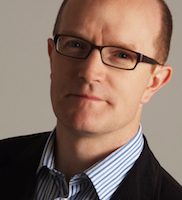 Simon Milner is Facebook’s Policy Director for UK, Middle East, Africa and Turkey. He is responsible for representing the company on issues such as privacy, safety, security and internet access. He joined the company in January 2012. He is a Board member of the Family Online Safety Institute (FOSI) and is a Director of the Tinder Foundation.
Simon Milner is Facebook’s Policy Director for UK, Middle East, Africa and Turkey. He is responsible for representing the company on issues such as privacy, safety, security and internet access. He joined the company in January 2012. He is a Board member of the Family Online Safety Institute (FOSI) and is a Director of the Tinder Foundation.
 Simon Milner is Facebook’s Policy Director for UK, Middle East, Africa and Turkey. He is responsible for representing the company on issues such as privacy, safety, security and internet access. He joined the company in January 2012. He is a Board member of the Family Online Safety Institute (FOSI) and is a Director of the Tinder Foundation.
Simon Milner is Facebook’s Policy Director for UK, Middle East, Africa and Turkey. He is responsible for representing the company on issues such as privacy, safety, security and internet access. He joined the company in January 2012. He is a Board member of the Family Online Safety Institute (FOSI) and is a Director of the Tinder Foundation.He previously held senior roles with BT, most recently as Director for Group Industry Policy, where he was responsible for policy development, articulation and advocacy on communications industry issues. Before BT he worked for the BBC including holding the position of Secretary, responsible for the Corporation's governance and accountability.
Annie Mullins OBE, Ask.fm (UK)
 Annie Mullins provides independent strategic consultancy to support digital social and gaming companies to safeguard online users and protect their reputations and brands. She is currently the Director of Trust and Safety for Ask.fm Europe.
Annie Mullins provides independent strategic consultancy to support digital social and gaming companies to safeguard online users and protect their reputations and brands. She is currently the Director of Trust and Safety for Ask.fm Europe.Annie was Vodafone Global Head of Content Standards for 10 years up until 2013, responsible for internal safety and editorial policies, consumer protection and educational campaigns, including producing and the leading Vodafone Digital Parenting Programme (www.vodafone.com/parents) and the industry education support site, Teachtoday. She was previously also Head of Social Policy for Yahoo! UK.
Annie has led many of the online industry self-regulatory initiatives at a UK and European level for the protection of children including Chair of the UK Home Office Good Practice Standards for Social Media for the Protection of Children, the industry EU ICT Coalition, and a former key member of the European Commission’s CEO Coalition. She is a co-founder of the Institute for Digital Wellbeing (I4DW) and sits on the Advisory Panel on Children’s Viewing at the British Board of Film Classification (BBFC). Annie was awarded the ISPA UK Internet Hero Award in 2007 and an OBE (public honour) in 2009 for services to children and young people online.
Kira O’Connor, Twitter (Ireland)
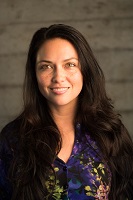 As Twitter’s EMEA Safety Outreach, Kira O’Connor works to define policy and ensure user safety and security in the challenging realm of modern social media. Kira and the global team work around the clock to keep Twitter users safe by fighting online abuse including targeted harassments, child sexual exploitation, human trafficking, and cyberbullying.
As Twitter’s EMEA Safety Outreach, Kira O’Connor works to define policy and ensure user safety and security in the challenging realm of modern social media. Kira and the global team work around the clock to keep Twitter users safe by fighting online abuse including targeted harassments, child sexual exploitation, human trafficking, and cyberbullying.
 As Twitter’s EMEA Safety Outreach, Kira O’Connor works to define policy and ensure user safety and security in the challenging realm of modern social media. Kira and the global team work around the clock to keep Twitter users safe by fighting online abuse including targeted harassments, child sexual exploitation, human trafficking, and cyberbullying.
As Twitter’s EMEA Safety Outreach, Kira O’Connor works to define policy and ensure user safety and security in the challenging realm of modern social media. Kira and the global team work around the clock to keep Twitter users safe by fighting online abuse including targeted harassments, child sexual exploitation, human trafficking, and cyberbullying.Kira joined Twitter in early 2013 as a part of the Media Partnerships team where she worked with government bodies, non-profit organisations, and high profile individuals - helping them to use Twitter effectively. Kira’s past experiences include policy at Access.org and LiveStrong, legal clerk and research assistant and, in a previous life, she was an on-air personality on both radio and TV.
Kira earned a B.A. in Media Studies and Mass Communications from the University of California, Berkeley and a Doctor of Jurisprudence from the University of Oregon School of Law. She is @KiraOConnor.
Brian O’Neill, Dublin Institute of Technology (Ireland)
 Brian O’Neill is Director, Research, Enterprise and Innovation Services at Dublin Institute of Technology. Brian’s research areas include media policy and digital technologies; media and information literacy, eSafety and information society policy for children. He has an international profile as a researcher on young people’s use of new media and the internet, and has conducted research for the European Commission, UNICEF, and the Broadcasting Authority of Ireland.
Brian O’Neill is Director, Research, Enterprise and Innovation Services at Dublin Institute of Technology. Brian’s research areas include media policy and digital technologies; media and information literacy, eSafety and information society policy for children. He has an international profile as a researcher on young people’s use of new media and the internet, and has conducted research for the European Commission, UNICEF, and the Broadcasting Authority of Ireland.Brian is a member of the EU Kids Online Management Group and leads the project in Ireland. He is a member of Ireland's Internet Safety Advisory Committee. He also chaired the Irish government’s task force on Internet Content Governance, reporting to the Minister for Communications, Energy and Natural Resources. In 2014, he undertook an independent assessment of internet safety for 16 companies represented in the ICT Coalition (www.ictcoalition.eu).
Andrea Parola, ICT Coalition for Children Online (Belgium)
 Andrea Parola is a consultant, based in Brussels. Since 2011 he has been the project manager of the ‘ICT Coalition for Children Online’, which is a self-regulatory platform with more than 20 leading companies to make the internet safer and better for children and young people.
Andrea Parola is a consultant, based in Brussels. Since 2011 he has been the project manager of the ‘ICT Coalition for Children Online’, which is a self-regulatory platform with more than 20 leading companies to make the internet safer and better for children and young people.Andrea is also Managing Director of EU Strategy, the company he founded in 2009, which is involved in public affairs and advocacy. Prior to creating his own company, Andrea worked at the European Commission for six years as political advisor to a Director, in the former DG Information Society and Media. Andrea holds a doctorate degree in Political Sciences, and a Post-doctoral specialisation in international relations.
Maaike Pekelharing, Meldpunt Kinderporno (Netherlands)
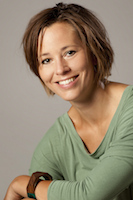 Since 2007, Maaike Pekelharing has been working for the Dutch hotline against child sexual abuse material on the internet: Meldpunt Kinderporno. This work consists of analysing child sexual abuse material. The Dutch hotline receives tens of thousands of reports per year and this amount is still growing. Maaike also coordinates the Helpwanted.nl helpline: a helpline for children, youngsters and their educators who have become a victim of online sexual abuse. The reports differ from girls who have been victims of sexting to boys who have been blackmailed after they have had webcam sex with someone they didn’t know. Together with her colleagues, Maaike advises the reporters what they can do.
Since 2007, Maaike Pekelharing has been working for the Dutch hotline against child sexual abuse material on the internet: Meldpunt Kinderporno. This work consists of analysing child sexual abuse material. The Dutch hotline receives tens of thousands of reports per year and this amount is still growing. Maaike also coordinates the Helpwanted.nl helpline: a helpline for children, youngsters and their educators who have become a victim of online sexual abuse. The reports differ from girls who have been victims of sexting to boys who have been blackmailed after they have had webcam sex with someone they didn’t know. Together with her colleagues, Maaike advises the reporters what they can do.
 Matas Petrikas is the CEO and co-founder of Vai Kai, a Berlin-based startup building intuitive connected wooden toys. Vai Kai believe that children should be able to play in the connected world using all their senses, with all their imagination, and not be stuck in front of screens.
Matas Petrikas is the CEO and co-founder of Vai Kai, a Berlin-based startup building intuitive connected wooden toys. Vai Kai believe that children should be able to play in the connected world using all their senses, with all their imagination, and not be stuck in front of screens.
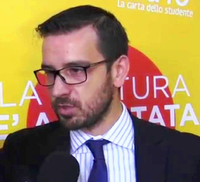 Giuseppe Pierro is Executive Director at the Ministry of Education, University and Research where he is currently in charge of the General Directorate of Students, Integration, Participation. Giuseppe graduated with an advanced degree in Communication Sciences and a PhD in Pedagogical Studies. He has over twenty years’ experience in the fields of education and communication. Moreover, he is currently project manager of the Italian Safer Internet Centre where he coordinates 10 project partners and more than 23 Advisory Board members.
Giuseppe Pierro is Executive Director at the Ministry of Education, University and Research where he is currently in charge of the General Directorate of Students, Integration, Participation. Giuseppe graduated with an advanced degree in Communication Sciences and a PhD in Pedagogical Studies. He has over twenty years’ experience in the fields of education and communication. Moreover, he is currently project manager of the Italian Safer Internet Centre where he coordinates 10 project partners and more than 23 Advisory Board members.
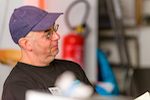 Chris describes himself as a Geek2NonGeekInterface, meaning that he is frequently translating between the two populations, promoting the creative use of digital and networked devices while helping users maintain privacy.
Chris describes himself as a Geek2NonGeekInterface, meaning that he is frequently translating between the two populations, promoting the creative use of digital and networked devices while helping users maintain privacy.
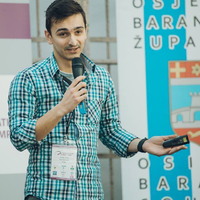 Boris Radanović is the Awareness Coordinator for Croatian Safer Internet Centre, established earlier this year (www.csi.hr). His main responsibility is to engage media and the general public in the debate about safer internet practices, as well as to develop new tools and services that are beneficial to the project. He is in his final year of completion for a Bachelor's Degree at a civil engineering college in Osijek.
Boris Radanović is the Awareness Coordinator for Croatian Safer Internet Centre, established earlier this year (www.csi.hr). His main responsibility is to engage media and the general public in the debate about safer internet practices, as well as to develop new tools and services that are beneficial to the project. He is in his final year of completion for a Bachelor's Degree at a civil engineering college in Osijek.
 Since 2007, Maaike Pekelharing has been working for the Dutch hotline against child sexual abuse material on the internet: Meldpunt Kinderporno. This work consists of analysing child sexual abuse material. The Dutch hotline receives tens of thousands of reports per year and this amount is still growing. Maaike also coordinates the Helpwanted.nl helpline: a helpline for children, youngsters and their educators who have become a victim of online sexual abuse. The reports differ from girls who have been victims of sexting to boys who have been blackmailed after they have had webcam sex with someone they didn’t know. Together with her colleagues, Maaike advises the reporters what they can do.
Since 2007, Maaike Pekelharing has been working for the Dutch hotline against child sexual abuse material on the internet: Meldpunt Kinderporno. This work consists of analysing child sexual abuse material. The Dutch hotline receives tens of thousands of reports per year and this amount is still growing. Maaike also coordinates the Helpwanted.nl helpline: a helpline for children, youngsters and their educators who have become a victim of online sexual abuse. The reports differ from girls who have been victims of sexting to boys who have been blackmailed after they have had webcam sex with someone they didn’t know. Together with her colleagues, Maaike advises the reporters what they can do.Maaike also has been one of the founders of the online reporting button for teenagers, meldknop.nl, a website where teenagers can find solutions to all their online problems such as bullying, hacking, spam, grooming and discrimination. This project is a cooperation between several organisations, including the Dutch police and De Kindertelefoon (the Dutch general child helpline).
Before working for the hotline, Maaike worked for the Dutch Ministry of Justice first as a policymaker on juvenile delinquency and later as a secretary for the Council for the Administration of Criminal Justice and Protection of Juveniles, both in The Hague. Maaike studied Child Development and Education at the University of Amsterdam.
Matas Petrikas, Vai Kai (Germany)
 Matas Petrikas is the CEO and co-founder of Vai Kai, a Berlin-based startup building intuitive connected wooden toys. Vai Kai believe that children should be able to play in the connected world using all their senses, with all their imagination, and not be stuck in front of screens.
Matas Petrikas is the CEO and co-founder of Vai Kai, a Berlin-based startup building intuitive connected wooden toys. Vai Kai believe that children should be able to play in the connected world using all their senses, with all their imagination, and not be stuck in front of screens.Prior to founding Vai Kai, Matas was one of the early employees at SoundCloud, producing web applications for the largest community of music and audio creators in the world.
Matas is a father of two daughters who are the biggest inspiration of Vai Kai.
Giuseppe Pierro, Ministry of Education, University and Research (Italy)
 Giuseppe Pierro is Executive Director at the Ministry of Education, University and Research where he is currently in charge of the General Directorate of Students, Integration, Participation. Giuseppe graduated with an advanced degree in Communication Sciences and a PhD in Pedagogical Studies. He has over twenty years’ experience in the fields of education and communication. Moreover, he is currently project manager of the Italian Safer Internet Centre where he coordinates 10 project partners and more than 23 Advisory Board members.
Giuseppe Pierro is Executive Director at the Ministry of Education, University and Research where he is currently in charge of the General Directorate of Students, Integration, Participation. Giuseppe graduated with an advanced degree in Communication Sciences and a PhD in Pedagogical Studies. He has over twenty years’ experience in the fields of education and communication. Moreover, he is currently project manager of the Italian Safer Internet Centre where he coordinates 10 project partners and more than 23 Advisory Board members.Chris Pinchen, Playfair Training/DigitalLiteracyLu (Luxembourg)
 Chris describes himself as a Geek2NonGeekInterface, meaning that he is frequently translating between the two populations, promoting the creative use of digital and networked devices while helping users maintain privacy.
Chris describes himself as a Geek2NonGeekInterface, meaning that he is frequently translating between the two populations, promoting the creative use of digital and networked devices while helping users maintain privacy.His work is highly focused on surveillance, censorship and privacy issues, and digital literacy, simplifying the complex to reach as wide an audience as possible.
As part of his drive towards including privacy, security and creativity into more mainstream areas, Chris recently co-founded Playfair Training, a learning and development company that combines soft skills, digital literacy and technical awareness training for the workplace.
He carries out further digital literacy programmes for schools/young people through DigitalLiteracyLu, is a BEE SECURE trainer and is working with BEE CREATIVE to introduce MakerSpaces in the public school system. Chris is also preparing a CryptoParty for Kids.
Boris Radanović, Croatian Safer Internet Centre (Croatia)
 Boris Radanović is the Awareness Coordinator for Croatian Safer Internet Centre, established earlier this year (www.csi.hr). His main responsibility is to engage media and the general public in the debate about safer internet practices, as well as to develop new tools and services that are beneficial to the project. He is in his final year of completion for a Bachelor's Degree at a civil engineering college in Osijek.
Boris Radanović is the Awareness Coordinator for Croatian Safer Internet Centre, established earlier this year (www.csi.hr). His main responsibility is to engage media and the general public in the debate about safer internet practices, as well as to develop new tools and services that are beneficial to the project. He is in his final year of completion for a Bachelor's Degree at a civil engineering college in Osijek.For the last couple of years, Boris has worked with many new Croatian IT startups and is experienced in social networks and social media marketing, as well as public speaking and public relations. For the last nine years, he has been a member and a teacher at a dance studio called Broadway in Osijek.
Ethel Quayle, University of Edinburgh (Scotland)
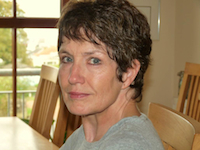 Ethel is Reader and clinical psychologist at the University of Edinburgh with a special interest in technology-mediated violence against children. For the last sixteen years, she has been working in the area of internet abuse images, collaborating internationally with government and non-government agencies. The work led to the development of the COPINE scale, a modified version of which is still used to determine the level of severity in IIOC (indecent images of children).
Ethel is Reader and clinical psychologist at the University of Edinburgh with a special interest in technology-mediated violence against children. For the last sixteen years, she has been working in the area of internet abuse images, collaborating internationally with government and non-government agencies. The work led to the development of the COPINE scale, a modified version of which is still used to determine the level of severity in IIOC (indecent images of children).
 Ethel is Reader and clinical psychologist at the University of Edinburgh with a special interest in technology-mediated violence against children. For the last sixteen years, she has been working in the area of internet abuse images, collaborating internationally with government and non-government agencies. The work led to the development of the COPINE scale, a modified version of which is still used to determine the level of severity in IIOC (indecent images of children).
Ethel is Reader and clinical psychologist at the University of Edinburgh with a special interest in technology-mediated violence against children. For the last sixteen years, she has been working in the area of internet abuse images, collaborating internationally with government and non-government agencies. The work led to the development of the COPINE scale, a modified version of which is still used to determine the level of severity in IIOC (indecent images of children).Martin Schmalzried, COFACE (Belgium)
 Martin Schmalzried holds a Master’s Degree from the ULB (Brussels) in Political Science and is a licensed sociology teacher in upper secondary education. He has been working at COFACE (Confederation of Family Organisations in the EU) as a Policy Officer for over five years.
Martin Schmalzried holds a Master’s Degree from the ULB (Brussels) in Political Science and is a licensed sociology teacher in upper secondary education. He has been working at COFACE (Confederation of Family Organisations in the EU) as a Policy Officer for over five years.His areas of expertise include safer internet and new technologies, and has been involved in a number of EU projects and initiatives linked to this field.
Martin is currently the chair of the SIP BENCH III project (review of parental control tools), a member of the POSCON (Positive Online Content and Services for Children in Europe) network and represents parents and families in DG CONNECT meetings such as the CEO and the ICT Coalitions. He was also responsible for the policy content of the #DeleteCyberbullying project.
He has supervised the development of a variety of tools such as Nutri-médias which aims at raising awareness of parents regarding advertising and nutrition and the #DeleteCyberbullying app that is designed to help teenagers, parents and teachers to deal with cyberbullying.
Brittany Smith, Google (UK)
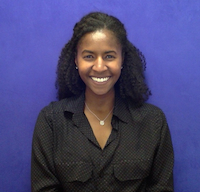 Brittany Smith works on Google’s public policy and government affairs strategy team in London. As EU Policy Strategy Lead for Child Safety, she manages Google’s work across Europe on child safety, digital literacy and controversial content.
Brittany Smith works on Google’s public policy and government affairs strategy team in London. As EU Policy Strategy Lead for Child Safety, she manages Google’s work across Europe on child safety, digital literacy and controversial content.
 Brittany Smith works on Google’s public policy and government affairs strategy team in London. As EU Policy Strategy Lead for Child Safety, she manages Google’s work across Europe on child safety, digital literacy and controversial content.
Brittany Smith works on Google’s public policy and government affairs strategy team in London. As EU Policy Strategy Lead for Child Safety, she manages Google’s work across Europe on child safety, digital literacy and controversial content.Having recently earned her MSc in women's studies and public policy from the London School of Economics and Political Science (LSE), her personal and professional interests lie at the intersection of internet policy and rights advocacy.
Kuno Sørensen, Save the Children (Denmark)
 Kuno Sørensen is a psychologist and senior child protection advisor with Save the Children Denmark. Since 2001, he was programme coordinator with a special focus on IT-related sexual abuse of children both on the Danish hotline against child abuse material and on the awareness website sikkerchat.dk (Safe chat). He worked as a member of the EU knowledge-enhancement project ROBERT (Risk-taking Online Behaviour – Empowerment through Research and Training), was a member of the EU Kids Online International Advisory Panel and has been a board member of the eNACSO non-governmental organisation (NGO) network. He has initiated counselling for sexual offenders, brydcirklen.dk (Break the circle), and conducted research and published articles on grooming and other online safety issues.
Kuno Sørensen is a psychologist and senior child protection advisor with Save the Children Denmark. Since 2001, he was programme coordinator with a special focus on IT-related sexual abuse of children both on the Danish hotline against child abuse material and on the awareness website sikkerchat.dk (Safe chat). He worked as a member of the EU knowledge-enhancement project ROBERT (Risk-taking Online Behaviour – Empowerment through Research and Training), was a member of the EU Kids Online International Advisory Panel and has been a board member of the eNACSO non-governmental organisation (NGO) network. He has initiated counselling for sexual offenders, brydcirklen.dk (Break the circle), and conducted research and published articles on grooming and other online safety issues.Richard Steppe, University of Leuven (Belgium)
 Richard Steppe is a PhD researcher attached to the Research Institute for Consumer, Competition and Market at the University of Leuven. He acquired his Master of Laws at the same university (magna cum laude, 2015) and also studied at the University of Copenhagen (Erasmus+) and Wake Forest University (as a Benjamin Franklin Transatlantic Fellow via a grant of the US State Department).
Richard Steppe is a PhD researcher attached to the Research Institute for Consumer, Competition and Market at the University of Leuven. He acquired his Master of Laws at the same university (magna cum laude, 2015) and also studied at the University of Copenhagen (Erasmus+) and Wake Forest University (as a Benjamin Franklin Transatlantic Fellow via a grant of the US State Department).Before taking up his academic mandate, Richard completed a number of legal internships at different institutions and law firms (among others UNICEF, NautaDutilh, Baker & McKenzie and the Belgian Supreme Court of Cassation) and participated to and received grants for a series of international conferences (among others, the Irish US Embassy's 'Innovation All-In' conference, the Belgian US Embassy's 'John Kerry's Forum on Youth Employment' and the 2013 and 2014 G20 Youth Forum).
Richard's current university research and teaching focuses on European economic law in the broad sense, including competition law, consumer law and the law of the European internal market.
Sharon Trotter, Australian Office of the Children’s eSafety Commissioner (Australia)
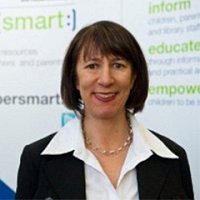 Sharon Trotter manages online content investigations within the new Australian Office of the Children’s eSafety Commissioner.
Sharon Trotter manages online content investigations within the new Australian Office of the Children’s eSafety Commissioner.
Agnes Uhereczky, COFACE (Belgium)
 Agnes Uhereczky is the director of COFACE, a European network representing families at EU level. The main policy areas of COFACE are family and social policy, sustainable consumption, fair and accessible financial services, disability and also all manner of issues related to safer internet.
Agnes Uhereczky is the director of COFACE, a European network representing families at EU level. The main policy areas of COFACE are family and social policy, sustainable consumption, fair and accessible financial services, disability and also all manner of issues related to safer internet.
 Krissa Watry is Co-Founder and CEO of Dynepic®, Inc. She holds a BS in Eng. Mech. from the USAF Academy and a MS in Mech. Eng. from MIT. She has served as a Captain in the US Air Force and spent 10 years designing, launching, and commanding spaceflight hardware. Krissa is now on a mission to inspire the next generation through play.
Krissa Watry is Co-Founder and CEO of Dynepic®, Inc. She holds a BS in Eng. Mech. from the USAF Academy and a MS in Mech. Eng. from MIT. She has served as a Captain in the US Air Force and spent 10 years designing, launching, and commanding spaceflight hardware. Krissa is now on a mission to inspire the next generation through play.
 Sharon Trotter manages online content investigations within the new Australian Office of the Children’s eSafety Commissioner.
Sharon Trotter manages online content investigations within the new Australian Office of the Children’s eSafety Commissioner.The team investigates complaints from Australian residents and law enforcement agencies about offensive and illegal online content, with a focus on child sexual abuse material (CSAM), working closely with law enforcement and INHOPE member Hotlines.
Prior to managing the online content team, Sharon led the highly-regarded Australian Cybersmart programme responsible for providing cybersafety resources to young people, parents and teachers. Key resources produced include the international award-winning resources Be Deadly Online, #Game On and Tagged.
Agnes Uhereczky, COFACE (Belgium)
 Agnes Uhereczky is the director of COFACE, a European network representing families at EU level. The main policy areas of COFACE are family and social policy, sustainable consumption, fair and accessible financial services, disability and also all manner of issues related to safer internet.
Agnes Uhereczky is the director of COFACE, a European network representing families at EU level. The main policy areas of COFACE are family and social policy, sustainable consumption, fair and accessible financial services, disability and also all manner of issues related to safer internet.Agnes created the Daphne funded #DeleteCyberbullying project in 2012, to firstly regroup the knowledge and best practices that were already out there under one roof, and secondly to raise awareness about the issue to as many parents, teens and teachers as possible. The project, among others, fostered a closer European cooperation on the issue, identified a number of existing challenges and potential solutions. The project also produced a smartphone app and an awareness-raising animation.
Agnes is an advocate for non-discrimination and fights inequalities in the different policy domains she is working on. She believes in positive messaging and collaboration, and has been mentoring young people with difficult situations since her student years, among others for the High/Scope Educational research programme.
Krissa Watry, Dynepic (USA)
 Krissa Watry is Co-Founder and CEO of Dynepic®, Inc. She holds a BS in Eng. Mech. from the USAF Academy and a MS in Mech. Eng. from MIT. She has served as a Captain in the US Air Force and spent 10 years designing, launching, and commanding spaceflight hardware. Krissa is now on a mission to inspire the next generation through play.
Krissa Watry is Co-Founder and CEO of Dynepic®, Inc. She holds a BS in Eng. Mech. from the USAF Academy and a MS in Mech. Eng. from MIT. She has served as a Captain in the US Air Force and spent 10 years designing, launching, and commanding spaceflight hardware. Krissa is now on a mission to inspire the next generation through play.Dynepic is building the Internet of Toys™ Playground – an IoT platform just for kids. Dynepic’s services will make it easier for app developers and toy manufacturers to develop and deploy child safe applications, entertainment, and connected toys. The first service on the platform is the iOKids™ Connect button - a login for kids to play online with friends while parents can manage verified consent, monitor their child’s play, and control their friends list in a single application. App developers can use the iOKids™ software development kits to easily include this login in their online applications to receive consent, utilise a child's parent-approved friends list, and meet online privacy protection regulations.


